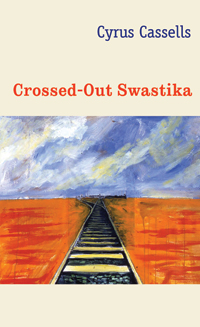Crossed-Out Swastika
by Cyrus Cassells
Copper Canyon Press, $16 (paper)
 Crossed-Out Swastika addresses themes with which post-industrial readers are well-versed—betrayal, surveillance, censorship—yet its characters speak from the literal, not virtual, geographies of World War II: the Gulag, Auschwitz. The speaker’s primary act of witness is identification with a mother who is a metonym, like Paul Celan’s Shulamite, for those eviscerated by history: “In my search for your cloud-wrapped past, / Mother, / the wounded earth became mine, / and each time I aligned myself / with the exiled, the disposed, / I aligned myself with you.” Questions of complicity, such as the one posed in “The Menagerie,” are context-specific, yet also read as trans-historical: “How could I go on, / a party to / this plunder-is-commonplace world / as deadly as nightshade or prussic acid, replete / with bestial ‘research’?” Apotropaic utterances from those sacrificed, such as Sophie Scholl, haunt: “Someday you will be / where I am now, / a steely, promonitory Sophie / proclaimed to the rapacious / Nazi tribunal that rushed her / to execution—.” Lines such as these suggest that modernist antinomies—hero or anti-hero, history as tragedy or farce—have been absorbed in a monoculture where market logic subtends all relationships. These poems identify the work that is left to poets scattered in the desert of the so-called real—to awaken the reader, after the successive shocks and normalizing regimes of globalized capitalism, from the emotional sclerosis of the totalized spectacle.
Crossed-Out Swastika addresses themes with which post-industrial readers are well-versed—betrayal, surveillance, censorship—yet its characters speak from the literal, not virtual, geographies of World War II: the Gulag, Auschwitz. The speaker’s primary act of witness is identification with a mother who is a metonym, like Paul Celan’s Shulamite, for those eviscerated by history: “In my search for your cloud-wrapped past, / Mother, / the wounded earth became mine, / and each time I aligned myself / with the exiled, the disposed, / I aligned myself with you.” Questions of complicity, such as the one posed in “The Menagerie,” are context-specific, yet also read as trans-historical: “How could I go on, / a party to / this plunder-is-commonplace world / as deadly as nightshade or prussic acid, replete / with bestial ‘research’?” Apotropaic utterances from those sacrificed, such as Sophie Scholl, haunt: “Someday you will be / where I am now, / a steely, promonitory Sophie / proclaimed to the rapacious / Nazi tribunal that rushed her / to execution—.” Lines such as these suggest that modernist antinomies—hero or anti-hero, history as tragedy or farce—have been absorbed in a monoculture where market logic subtends all relationships. These poems identify the work that is left to poets scattered in the desert of the so-called real—to awaken the reader, after the successive shocks and normalizing regimes of globalized capitalism, from the emotional sclerosis of the totalized spectacle.





